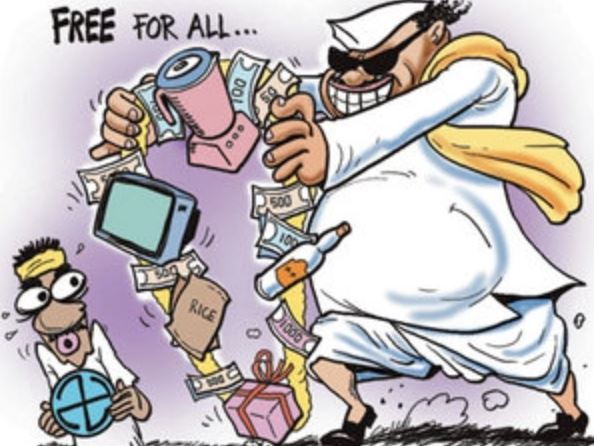Freebies – A passport to fiscal disaster

Context: Illustratively, in the case of Punjab, while estimates vary, some have speculated that the promise of freebies around the election might cost around Rs 17,000 crore for their implementation. The debt-to-GDP ratio of Punjab is already at 53.3 per cent for 2021-22, which would worsen on account of these new measures.

Freebies
- There is great ambiguity in what “freebies” mean.
- There is a need to distinguish between the concept of merit goods and public goods on which expenditure outlays have overall benefits.
- Examples of this are the strengthening and deepening of the public distribution system, employment guarantee schemes, support for education and enhanced outlays for health, particularly during the pandemic.
- All over the world, these are considered to be desirable expenditures.
Why does the macroeconomic stability of the Union matter?
- India is a Union of states. It is not a confederation of states. It is not a question of holding together but of coming together. The Union is indestructible.
- The configuration of the states which constitute the Union can change. The Union, therefore, is integral to both the Centre and the states. The strength of the Centre lies in the strength of the states.
- Therefore, the macroeconomic stability of the Union is contingent on the macroeconomic stability of both the Centre and states.
How expensive are freebies for the economy, life quality and social cohesion in the long run?
Macroeconomic stability:
- Freebies undercut the basic framework of macroeconomic stability.
- The politics of freebies distorts expenditure priorities. Outlays are being concentrated on subsidies of one kind or the other.
- This will distress the fiscal sustainability of states which are already debt-stressed.
Expenditure priority:
- In the long run, the freebies culture will distort expenditure priority.
- It will not only invite intergenerational inequality but also affects the broader principles of equity and morality.
Social inequalities:
- The issue of intergenerational equity leads to greater social inequalities because expenditure priorities are distorted away from growth-enhancing items.
Environmental impact:
- When we talk of freebies, it is in the context of providing, for example, free power, or a certain quantum of free power, water and other kinds of consumption goods.
- This distracts outlays from environmental and sustainable growth, renewable energy and more efficient public transport systems.
Agricultural priorities:
- The freebies culture will cause the distortion of agricultural priorities in the long run.
- This affects agricultural practices which do not depend on extensive use of water and fertilizers.
- The depleting supply of groundwater is an important issue to consider when speaking of freebies about the free consumption of goods and resources.
The debilitating effect on the future of manufacturing:
- Freebies lower the quality and competitiveness of the manufacturing sector by detracting from efficient and competitive infrastructure enabling high-factor efficiencies in the manufacturing sector.
Subnational bankruptcy:
- Freebies bring into question market differentiation between profligate and non-profligate states and whether we can have a recourse mechanism for subnational bankruptcy.
Way forward
- The race to the bottom implies government deregulation of markets and businesses.
- This means eventually that the states compete to underbid each other in lowering taxes, expenditures and regulations.
- We must strive instead for a race to efficiency through laboratories of democracy and sanguine federalism where states use their authority to harness innovative ideas and solutions to common problems which other states can emulate.
- Therefore, it’s not about how cheap the freebies are but how expensive they are for the economy, life quality and social cohesion in the long run.
- We must dread the thought of replicating the culture of competitive freebie politics.
- We must go the route of achieving higher rates of economic growth. The race to efficiency is the race to prosperity.
Practice Question for Mains
- It’s not about how cheap the freebies are but the focus must be on how expensive they are for the economy, life quality and social cohesion in the long run. Critically examine. (250 Words, 15 Marks)
If you like this post, please share your feedback in the comments section below so that we will upload more posts like this.

